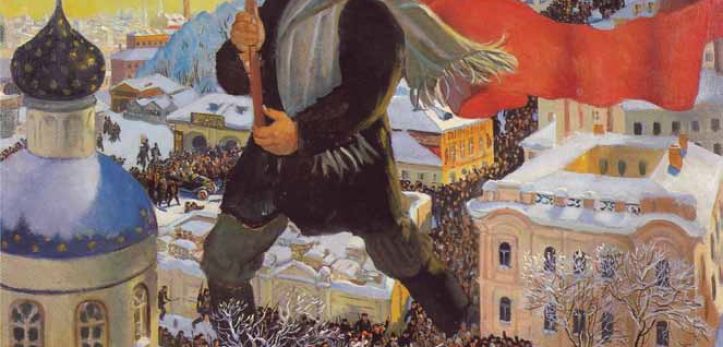Anti-Christian propaganda: Communist Russia
Author: Grzegorz Kucharczyk,
"Love One Another!" 31/2015

According to the founders of Marxist ideology, one of the greatest obstacles on the road to socialism was religion. Karl Marx, in his notorious adage, called it “opium for the masses.”

Religion: “opium” and “booze”
Written in 1844, a commentary to Hegel’s Philosophy of Right carries the following words of the young Marx: “The abolition of religion as the illusory happiness of the people is the demand for their real happiness.”
This conviction of the founder of “scientific” socialism was fully shared by the leader of the Bolshevik Revolution and the man responsible for establishing the Soviet totalitarian regime, Vladimir I. Lenin. In Socialism and Religion, an article written in 1905, he argued: “Religion is one of the forms of spiritual oppression which everywhere weighs down heavily upon the masses of the people, over-burdened by their perpetual work for others, by want and isolation. […] Religion is a sort of spiritual booze, in which the slaves of capital drown their human image, their demand for a life more or less worthy of man. […] The proletariat of today takes the side of socialism, which enlists science in the battle against the fog of religion, and frees the workers from their belief in life after death by welding them together to fight in the present for a better life on earth.”
“Wisdom of stage” – let us speak not of struggle but of “separation”
Lenin (like Stalin after him) divided the imposition of the Communist political system and ideology on the Russians and other nations into “stages”. First the tsar and his family were murdered, and then the aristocracy and tsarist army officers were eliminated. This was followed by the extermination of the “enemies of the people”, hiding among the people themselves (e.g. the “anti-kulak” campaigns in Russian agriculture during the 1930s and the suppression of the Kronshtadt Rebellion in 1921).
A similar “stage” approach can be seen in the war on Christian religion waged by Lenin and the system of power he created after 1917. Reassuring slogans were published that were meant to convince the public that the goal of the Bolsheviks was only “the separation of the Church from the State.” The Bolshevik government (the Council of People’s Commissars) announced the separation by a special decree on 23 January 1918.
The time came to crackdown on “religious superstition”. There were two major goals: to destroy the Orthodox Church as an autonomous institution and to take over its property
However, anyone familiar with Lenin’s pre-Revolution manifestos knew that the word “separation” had to be understood as “attack”. In Socialism and Religion (1905), Lenin wrote: “We demand complete disestablishment of the Church so as to be able to combat the religious fog.” But be careful! The intention is – as we read in the text – a struggle “with purely ideological and solely ideological weapons, by means of our press and by word of mouth.” There was no point in showing one’s true colours too early (in 1905!), before winning real power.
Already in November 1918, Lenin warned the Bolsheviks: “We must be very careful in combating religious superstition. […] If we take too harsh a course, we may only cause widespread resentment.” This was then the “wisdom of stage”. Russia was torn apart by a bloody civil war in which the Bolsheviks had to fight not only against the counterrevolutionary “white” armies, but also most of the Russian left (socialist revolutionaries, anarchists, etc.). In 1918, several dozen anti-Bolshevik strikes were organized by workers in Petrograd alone.
This is not to say that Russian Christianity was not persecuted soon after the Bolshevik takeover. Violence swept across Russia and hit orthodox churches and monasteries as well with great vehemence. This came in the wake of a decree announcing the forfeiture of all property – movable and immovable – belonging to the Russian Orthodox Church. The Bolsheviks published that decree on 20 January 1918, three days before the official “separation of Church and State”.
Before 1920, 673 of the 1,025 Orthodox monasteries in Russia were raided and plundered by Bolshevik armed groups. In many cases, raids by Communist robbers were opposed by both monks and also by laymen, who came to their defence.
The “greedy” Church and “humane” Bolsheviks
Adopted in July 1918, the first Bolshevik constitution, besides upholding the principle of the “separation” of Church and State, ensured all citizens of “the freedom of religious propaganda and antireligious propaganda”. In the same document, however, the entire clergy (Orthodox and Catholic), together with “capitalists, merchants, former policemen, criminals and imbeciles” were classified as “outlaws” or disenfranchised people (in 1932, clergymen were officially banned from settling in cities). In this way, the Bolsheviks’ constitution became itself a propaganda document. First, by giving an illusory impression that Christians enjoyed “freedom of religious propaganda” in Russia after 1917. Secondly, by bracketing clergymen with groups on the fringes of society.
Lenin warned the Bolsheviks: “We must be very careful in combating religious superstition. […] If we take too harsh a course, we may only cause widespread resentment.”
The only true announcement made in the Bolshevik constitution concerned the freedom of antireligious propaganda (above all anti- Christian). After the Bolsheviks’ victory in the civil war (1920), the time came to crackdown on “religious superstition”. There were two major goals: to destroy the Orthodox Church as an autonomous institution and to take over its property, above all precious metals (gold and silver). In early 1922, the tsar’s gold reserves, taken over by the Bolsheviks, ran out. The gold had been used to purchase arms and ammunition in the West for the Red Army and food for the party apparatus (not for the starving population, to be sure). In 1921, famine began in Povolzhye (Volga Region), which took five million lives in 1921– 1922. The disaster was brought about by food requisitions carried out by the Bolsheviks as part of the so-called militant communism. Additionally, the policy of starving the Russian countryside was, according to Lenin, helpful in the struggle against the “class enemy” (Povolzhye witnessed a number of anti-Bolshevik rebellions in 1921; the largest took place in the Tambov Guberniya). The famine struck not only peasants but also the Orthodox Church, which took its vitality (in a sociological sense) above all from the Russian peasants. The Church was subjected to a vituperative propaganda attack, designed to achieve the Bolshevik government’s principal goal, namely robbing the Church of its property.
In early 1922, a huge anti-Church propaganda campaign was launched, headed by Trotsky, who had been assigned this task by Lenin. Under the slogan “Exchange gold for bread”, invented by the former, Orthodox churches were plundered and desecrated on a mass scale across Russia. Large numbers of priests and bishops were killed. The Bolshevik propaganda trumpeted that the plundered gold was used to purchase food for the people of Povolzhye, starving since 1921. In reality, it was used primarily to buy arms and clothing for the Red Army and food for the party apparatus. At the same time, the Bolsheviks would close down institutions which the Church had set up to bring relief to the starving population of Povolzhye.
Removing “improper” books
The Bolsheviks’ propaganda attack on Christianity had yet another aspect: censorship of religious publications. In the early 1920s, the Commissariat of Education ordered the removal of books designated as “improper” from libraries across Russia. Besides such authors as Plato and Kant, the first writers assigned to this category were those who had defended Christianity (the rich religious literature of the Russian Orthodox Church).
It was no mere coincidence that this purging of libraries was particularly thorough in the countryside. First, most Russians lived in rural areas at that time. Secondly, it was the peasants who were the natural social “power base” of the Orthodox Church. “Improper” books were to be replaced by books which were right and proper from the Bolshevik point of view. The purpose was not only the promotion of the output of Marxist “classics” or of Lenin himself. In this context, Lenin’s recommendation from the early 1920s is telling: to stock Russian libraries with the major works of the French Encyclopaedists (Enlightenment authors). From the point of view of the Communist authorities, the anti-Christian tenor of their works could hardly be overestimated. Additionally, for propaganda purposes, the regime could claim to draw on “the achievements of Western civilization”.
The main target: young people
In April 1923, during the 12th Congress of the Bolshevik Party, it was resolved to “intensify systematic propaganda, carried out graphically and convincingly, showing to every worker and peasant the lie and denial of their interests inherent in every religion.”
The method chosen by the leadership of the Communist Party (propaganda instead of mass physical terror) was absolutely conscious. The resolution of the 1923 Congress said that the use of more aggressive methods “would only strengthen religious fanaticism” (read: the resistance of believers).
The main target of this heightened propaganda effort were young Russians. Actually, they were not only a target but also an instrument of its execution. That ensued from the guidelines of the Bolshevik Party Congress, which made the Young Communist League (Komsomol) responsible for antireligious propaganda. Membership in the Komsomol was de facto obligatory for all students of Soviet schools.
In line with its role of the “conveyor belt of the party”, the Komsomol issued, at its Congress in June 1923, a call to its members to engage in “advanced and systematic antireligious propaganda.” In 1929, the newspaper Komsomolskaya Pravda spurred its readers to action, stressing that “we must arm ourselves with the dynamite of class hatred and fight with all means available against kind-heartedness, in an antireligious struggle.”
Adopted in the same year, a new constitution of the Soviet Union said: “In order to ensure citizens of freedom of conscience […] Freedom of religious worship and freedom of antireligious propaganda is recognized for all citizens.” In the Soviet state, from that time on, there was only room – as was officially spelled out – for propaganda by the godless.
The Militant Godless and their media empire
In 1925, a member of the Bolshevik leadership, Yemelyan M. Yaroslavsky (born Minei Izrailevich Gubelman), founded the All-Soviet Godless League (since 1929 the Militant Godless League).
Godless propaganda had a huge media concern at its disposal in the 1920s. Published since 1922 was an all-Soviet weekly, The Godless, which later became the press organ of the Godless League (in the 1930s, its circulation was half a million). It was not the only title of the godless press published in Russia after 1917. High circulation was also enjoyed by the Antireligioznik weekly, and The Godless carried various editions designed for the various nations of the Soviet Union. In 1929–1935, a Polish- language version was published with the title Bezbożnik Wojujący (the godless propaganda was also addressed to the members of other religions: The Godless came out in the Tartar and Yiddish languages as well). The Godless League’s radio programmes were broadcast in fourteen languages. Special “antireligious films” were produced. The Godless weekly had its “association of friends”. There was also an organization for young members called The Young Godless.
Source: https://loamagazine.org/archive/2015/2015-31/anti-christian-propaganda-communist-russia
The article was published with the permission from "Love One Another!" in September 2020.
Submit
your article!
Read
more articles - Free!
Need
translation jobs? Click here!
Translation
agencies are welcome to register here - Free!
Freelance
translators are welcome to register here - Free!
Subscribe
to TranslationDirectory.com newsletter - Free!
Take
part in TranslationDirectory.com poll - your voice counts!
|





